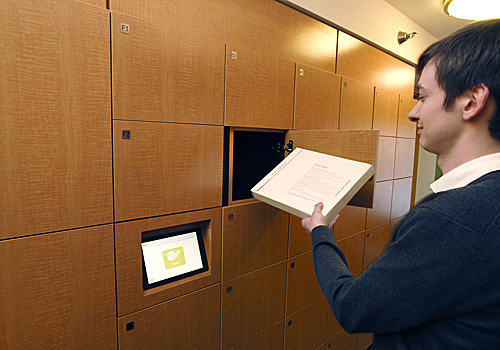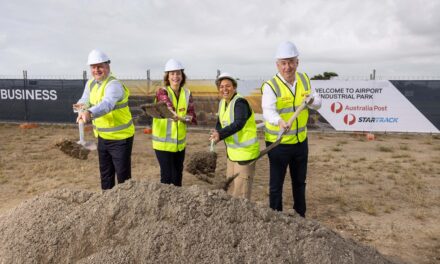
Parcel terminal concept completing postal apprenticeship
As Ireland becomes the latest country preparing to roll out automated self-service parcel terminals, James Cartledge speaks to Australia’s answer to Donald Trump, who believes the parcel terminal concept is the next big thing in e-commerce logistics. While many consumers outside of the strongholds of Germany and Poland may not have heard of automated parcel terminals yet, one of Australia’s highest-profile businessmen tells Post&Parcel that among the postal industry, awareness of the potential of this technology is now spreading right the way across the world.
Mark Bouris founded Australia’s second largest non-bank mortgage company, Wizard Home Loans, before it was sold for half a billion dollars to GE Money in 2004.
Perhaps more famous now in his home country for hosting the television programme “The Apprentice” (as hosted by Donald Trump in the United States and Sir Alan Sugar in Britain), Bouris currently runs a company that has been quietly pioneering its own brand of self-service parcel delivery terminals over the past 12 years, before launching it last year.
The recent explosion in online commerce has come as consumers have found it increasingly easy and secure to make purchases over the Internet. Bouris says now package delivery has to catch up – and this is where parcel terminals come in.
The terminals comprise a bank of lockers into which parcels can be securely stowed by mail carriers. On delivery, PIN codes are sent via email or text message to consumer recipients, who can visit the terminals, type their personal code into a central touchscreen control unit that then opens the relevant locker for them to pick up their package.
Bouris’ company, Telezygology (TZ) Inc., developed its parcel terminal system out of a smart locking technology that can be remotely accessed. The technology is already being used for securing computer data centres around the world, but suits parcel terminals well since it is easily networked.
“The greatest potential for this technology is to solve that last mile of delivery for online purchases,” says the TZ chairman. “Postal organisations are sitting on the precipice of one of the greatest changes in how we buy retail that we’ve ever seen, by using the Internet.

The first big commercialisation for the TZ parcel terminals has been a trial with Australia Post over the Christmas period
“But there’s no point in being able to transact online but not being able to receive the purchase. So that last mile needs to be automated and secured, and easy to deal with.
“Our technology has answered that, and we’ve answered that for the Australian postal service,” says Bouris, referring to perhaps the biggest commercial milestone his parcel terminal technology has achieved so far – a four-month trial with Australian Post.
The trial lasted four months, with the state-run postal service looking at three installations, each comprising a bank of 52 lockers, within Sydney, Melbourne and Brisbane over the recent Christmas period.
Bouris says the high profile nature of Australia Post’s innovation and the trial itself, his company is now receiving interest in its parcel terminal technology from as far afield as South and North America, Europe, Africa and the Middle East.
Partner
As with its Australia Post trial, the company has a major partner in place, through which it is establishing important credentials in the postal world – Pitney Bowes.
The US mailing technology giant has a highly recognisable brand in this sector, but for TZ it is important in providing integration for the parcel terminals with postal service delivery infrastructure – to ensure that when a consumer opts to have a parcel delivered to a parcel terminal, that is where it will go.
“We do the manufacturing, Pitney Bowes provides the integration,” explains Bouris. “It makes it very easy for a postal service to integrate – it takes a couple of months to design the system, but our technology is non-proprietary, so it makes it easy to work with other technologies.”
With Australia Post now looking to establish 30 “super store” post offices around the country by the summer, parcel terminal technology is set to gain a permanent position in the nation’s retail network, although Bouris says the company is yet to confirm the provider of its full roll-out.
Parcel terminal technology has been in use within Europe for more than 10 years, with industry leaders Deutsche Post already hosting a network of more than 2,400 “Packstations” in Germany. With the e-commerce boom of the last few years, the technology has appeared to surge forward quite suddenly recently.
Many postal operators around the world are now beginning to trial the parcel terminals, or even implement permanent networks. Operators in Russia, Scandinavia, around the Baltic, Spain, Belgium, Cyprus, Chile, the UAE, and now Ireland are getting on board with parcel terminal technology.
“I think the trial period is over for this technology – I think everybody is into implementation now,” says Bouris.
“Australia’s a very good bellwether for this technology. We are one of the biggest online buyers in the world, and Australia is usually quicker off the mark on this kind of thing than anywhere else in the world. And right now, we’re moving from trial towards implementation in this country.”
Even the United States Postal Service has been taking another look at parcel terminal technology, with a trial currently underway in Northern Virginia, having looked at previous versions down through the years without taking the plunge.
TZ is already entering the US market, though its installations are starting out within apartment buildings, partnering with property management companies. Although the firm is listed on the Australian stock exchange, its global headquarters is in Chicago, Illinois, giving it a strong link with the world’s largest postal market.

TZ has had one of its residential systems in place within a Chicago apartment building for a year
“We’ve actually had one working for a year now, in a block of apartments in Chicago,” says Bouris of the TZ Concierge System installed in the 50-storey Sterling Private Residences Tower near the Chicago River.
“We have a lease plan with this particular block in Chicago, and it’s been very successful, no break downs – it all works well. Right now, we’re rolling that out across America.”
Competing in the market
With a potentially huge market available for parcel terminal technology throughout the postal world, TZ finds itself something of a newcomer in the market compared to relatively established firms like Austria’s KEBA and Poland’s Integer.pl, despite the long gestation period of its system.
Bouris says some of the key selling points for his company’s system are its cost effectiveness and ease of integration.
Bouris explains that the TZ locking system is relatively inexpensive because it uses a special alloy for the opening mechanism, rather than costly copper solenoids. The TZ chairman claims that his company’s locks cost 40 cents to produce, compared to $40 solenoid systems.
The Shared Memory Alloy technology also eliminates electromagnetic fields, meaning that data and other sensitive items are not interfered with by the locking mechanism.
“We have open architecture in our system, so our system will talk to nearly every other system in the world,” he says. “Our system works with other technologies – you can use an RFID card or a fingerprint scanner or even a face scanner to open these lockers, you can send a photograph back to the administration to show who has accessed the parcel.”
The TZ locking technology means the opening mechanism for the lockers is very small compared to conventional systems, leaving more space for parcels and for added functions like temperature or humidity control systems, says Bouris.
“What’s important nowadays, whatever the enclosure, is that inside your locker there is real estate. You can’t take up too much room. Ours takes up the least amount of room of any lock in the world today,” says Bouris.
With the TZ terminals manufactured by partner company Dexion in Mexico, Bouris says there is plenty of capacity to fulfill global demand for this last mile alternative to missed deliveries or unsecure parcel delivery.
While some companies invest in networks of parcel shops or intricate systems for consumers to select ever more precise delivery windows, Bouris believes the time has come for parcel terminals.
And, as well as postal services and apartment building operators, TZ’s technology is already being noticed by some of the big e-commerce merchants.
“Our technology allows delivery to be as seamless and as fulfilling and as enjoyable as actually buying the product online,” says the TZ chairman. “Postal services get a lot of blame when these packages cannot be delivered, but our technology solves that.”
Bouris believes that a big increase in deployment of parcel terminals around the world will come this summer, leaving enough time to prepare systems for the festive peak.
“Everybody’s going to try to get this in place by Christmas,” he says.













